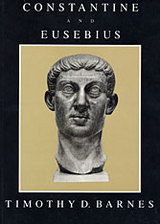
This study of the Roman Empire in the age of Constantine offers a thoroughly new assessment of the part Christianity played in the Roman world of the third and fourth centuries.
Timothy D. Barnes gives the fullest available narrative history of the reigns of Diocletian and Constantine. He analyzes Constantine’s rise to power and his government, demonstrating how Constantine’s sincere adherence to Christianity advanced his political aims. He explores the whole range of Eusebius’ writings, especially those composed before Constantine became emperor, and shows that many attitudes usually deemed typical of the “Constantinian revolution” were prevalent before the new Christian empire came into existence. This authoritative political and cultural history of the age of Constantine will prove essential to students and historians of the ancient world.
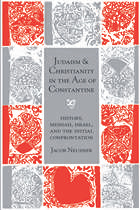
In a close analysis of texts by the Christian theologians Eusebius, Aphrahat, and Chrysostom on one hand, and of the central Jewish works the Talmud of the Land of Israel, the Genesis Rabbah, and the Leviticus Rabbah on the other, Neusner finds that both religious groups turned to the same corpus of Hebrew scripture to examine the same fundamental issues. Eusebius and Genesis Rabbah both address the issue of history, Chrysostom and the Talmud the issue of the Messiah, and Aphrahat and Leviticus Rabbah the issue of Israel. As Neusner demonstrates, the conclusions drawn shaped the dialogue between the two religions for the rest of their shared history in the West.
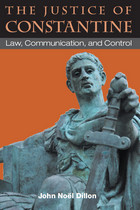
As the first Christian emperor of Rome, Constantine the Great has long interested those studying the establishment of Christianity. But Constantine is also notable for his ability to control a sprawling empire and effect major changes. The Justice of Constantine examines Constantine's judicial and administrative legislation and his efforts to maintain control over the imperial bureaucracy, to guarantee the working of Roman justice, and to keep the will of his subjects throughout the Roman Empire.
John Dillon first analyzes the record of Constantine's legislation and its relationship to prior legislation. His initial chapters also serve as an introduction to Roman law and administration in later antiquity. Dillon then considers Constantine's public edicts and internal communications about access to law, trials and procedure, corruption, and punishment for administrative abuses. How imperial officials relied on correspondence with Constantine to resolve legal questions is also considered. A study of Constantine's expedited appellate system, to ensure provincial justice, concludes the book.
Constantine's constitutions reveal much about the Theodosian Code and the laws included in it. Constantine consistently seeks direct sources of reliable information in order to enforce his will. In official correspondence, meanwhile, Constantine strives to maintain control over his officials through punishment; trusted agents; and the cultivation of accountability, rivalry, and suspicion among them.



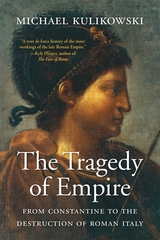
A sweeping political history of the turbulent two centuries that led to the demise of the Roman Empire.
The Tragedy of Empire begins in the late fourth century with the reign of Julian, the last non-Christian Roman emperor, and takes readers to the final years of the Western Roman Empire at the end of the sixth century. One hundred years before Julian’s rule, Emperor Diocletian had resolved that an empire stretching from the Atlantic to the Euphrates, and from the Rhine and Tyne to the Sahara, could not effectively be governed by one man. He had devised a system of governance, called the tetrarchy by modern scholars, to respond to the vastness of the empire, its new rivals, and the changing face of its citizenry. Powerful enemies like the barbarian coalitions of the Franks and the Alamanni threatened the imperial frontiers. The new Sasanian dynasty had come into power in Persia. This was the political climate of the Roman world that Julian inherited.
Kulikowski traces two hundred years of Roman history during which the Western Empire ceased to exist while the Eastern Empire remained politically strong and culturally vibrant. The changing structure of imperial rule, the rise of new elites, foreign invasions, the erosion of Roman and Greek religions, and the establishment of Christianity as the state religion mark these last two centuries of the Empire.

“As Kulikowski presents it, the end of the Roman Empire in the West was mean and dirty—and thoroughly Roman…In a brilliant tour d’horizon of the West from Ireland to the Black Sea, he measures the effect of the fall of Rome on the world beyond Rome.”
—Peter Brown, New York Review of Books
“A tour de force history of the inner workings of the late Roman Empire.”
—Kyle Harper, author of The Fate of Rome
“Kulikowski writes boldly and fluently about imperial politics, incorporating the latest scholarship yet avoiding getting bogged down in academic controversies. Highly recommended.”
—Hugh Elton, author of The Roman Empire in Late Antiquity
“Weaving together…complex family affairs, rebels, battles, coups, and intrigue into engaging prose, Kulikowski’s book is an enjoyable read for anyone who is interested in late Roman history.”
—Minerva Magazine
One hundred years before the reign of Julian, the last non-Christian emperor of Rome, Diocletian had come to the conclusion that an empire stretching from the Rhine to the Euphrates could not effectively be governed by one man. He had devised a new system of governance to respond to the vastness of the Roman Empire, its new rivals, and the changing face of its citizenry.
Michael Kulikowski traces two hundred years of Roman history—from the late fourth century to the end of the sixth—during which the Western Empire ceased to exist while the Eastern Empire remained politically strong and culturally vibrant. He captures the changing structure of imperial rule, the rise of new elites, foreign invasions, the erosion of Roman and Greek religions, and the establishment of Christianity as the state religion.
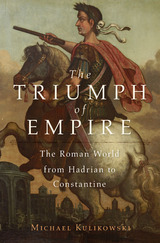
“A genuinely bracing and innovative history of Rome.”
—Times Literary Supplement
The Triumph of Empire takes us into the political heart of imperial Rome and recounts the extraordinary challenges overcome by a flourishing empire. Roman politics could resemble a blood sport: rivals resorted to assassination as emperors rose and fell with bewildering speed, their reigns sometimes measured in weeks. Factionalism and intrigue sapped the empire from within, and imperial succession was never entirely assured.
Michael Kulikowski begins with the reign of Hadrian, who visited the farthest reaches of his domain and created a stable frontier, and takes us through the rules of Marcus Aurelius and Diocletian to Constantine, who overhauled the government, introduced a new state religion, and founded a second Rome. Despite Rome’s political volatility, imperial forces managed to defeat successive attacks from Goths, Germans, Persians, and Parthians.
“This is a wonderfully broad sweep of Roman history. It tells the fascinating story of imperial rule from the enigmatic Hadrian through the dozens of warlords and usurpers who fought for the throne in the third century AD to the Christian emperors of the fourth—after the biggest religious and cultural revolution the world has ever seen.”
—Mary Beard, author of SPQR
“This was an era of great change, and Kulikowski is an excellent and insightful guide.”
—Adrian Goldsworthy, Wall Street Journal
READERS
Browse our collection.
PUBLISHERS
See BiblioVault's publisher services.
STUDENT SERVICES
Files for college accessibility offices.
UChicago Accessibility Resources
home | accessibility | search | about | contact us
BiblioVault ® 2001 - 2024
The University of Chicago Press









